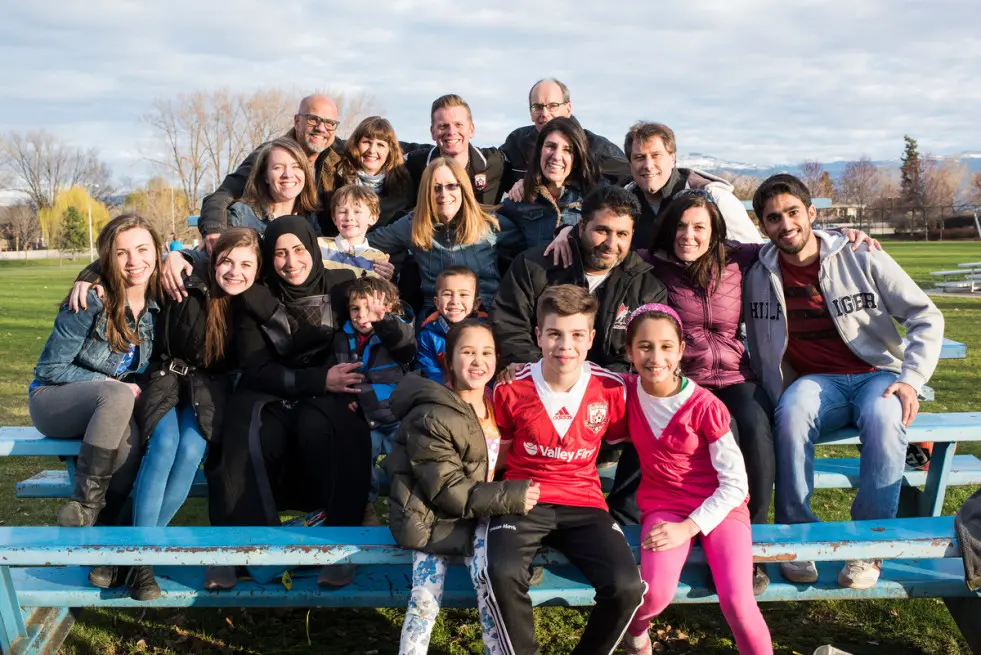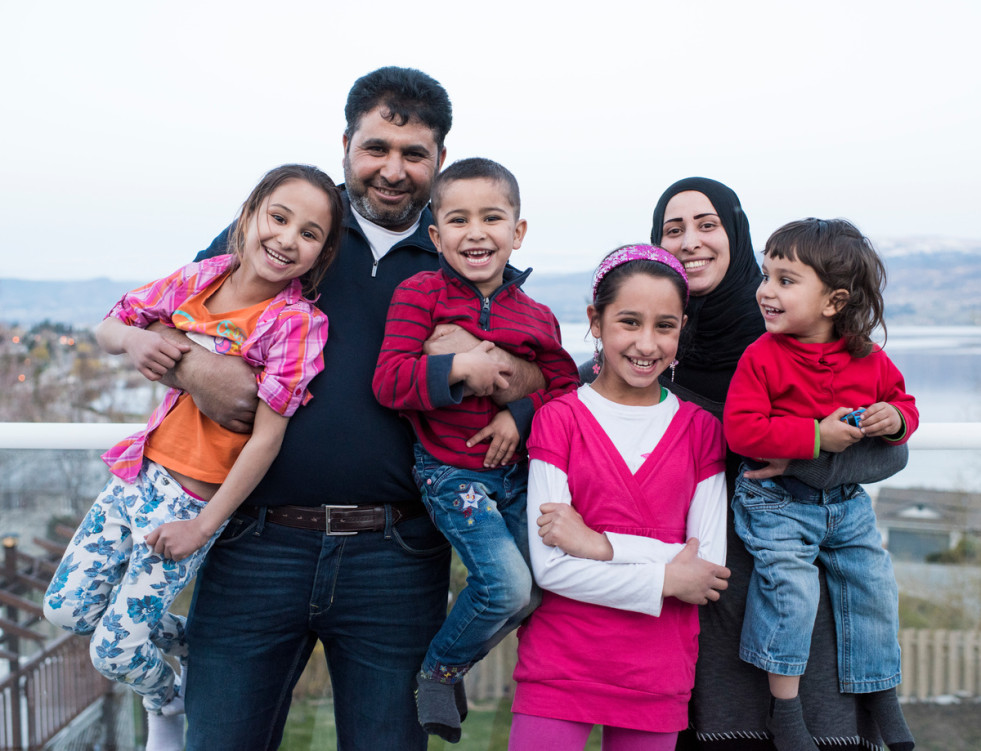Mohammad and Sahar sat across the aisle from one another, each with a son and daughter to care for during the 13-hour flight. Refugees from Syria, they had never been on a plane before. This life-changing journey would take them on four in as many days.
Behind them was what remained of their house in Homs and the strange hybrid structure – not quite a tent, but definitely not a house – in a farmer’s field in Lebanon, where Mohammad had eked out a living for them for four years.
Ahead: Canada. That’s all they knew.
If Sahar didn’t know much about Canada, she had heard things. The most important to her was that it was a peaceful country where her children would be safe. After years of uncertainty, nothing mattered more.
Mohammad’s concerns were more immediate. He was hoping, he says, for “somebody who spoke Arabic who could tell us where we were going.”

Mohammad, Sahar and their children gather for a photo with their sponsors and volunteers during an outing to the park. © UNHCR / Jimmy Jeong
When the glass doors finally slid open at the airport in Kelowna, British Columbia, four Arabic-speaking interpreters greeted them, the first of a small army of sponsors and volunteers who had been preparing for their arrival for weeks.
Mohammad and Sahar are privately sponsored refugees. That means a group of private citizens, approved by the Canadian Government, has offered to take on the costs and obligations that go with resettling the family. They also offer friendship.
The process is complicated, but Gioia Morris is a study in determination. Moved by “scenes of suffering on television,” she quickly overcame the first and largest of the Government’s requirements: finding at least four more Canadian adults willing to sign a financial guarantee. A mix of professional and business people, old and new friends, the group took only two meetings to decide to move ahead, says Duane Ophus, a city councilor who is among the sponsors. And they weren’t alone.

Mohammad and Sahar pose with their children on the balcony of the house their Canadian sponsors have rented for them. © UNHCR / Jimmy Jeong
“A movement.” That’s what sponsor Greg Andreen calls the tsunami of support they have received. Friends and relative strangers volunteer time and sometimes money to help Mohammad, Sahar and the children adapt to their new surroundings. Too many stories for a short space, but some must be told.
Housing is always a pressing concern for sponsorship groups. Size, proximity to the sponsors, affordability and safety are all factors. As the Syrian family’s arrival drew near and no suitable accommodation could be found, sponsor Barb Andreen asked a friend if he would lend them his house. Gioia now says, “I thought … ‘Really? Who would do that?’ ”
“In those days, they called me a refugee.”
Emil Dimitrov would. The swim coach gamely packed up his personal effects and moved into his own basement guest suite, where he’s lived for the past two months. He knows what it means to start over. In 1990, en route from Bulgaria to a swim meet, Emil asked Canadian authorities for political asylum during a refueling stop in Gander, Newfoundland. “In those days, they called me a refugee,” he says.
“I found Zanie on an internet site,” councillor Duane explains. Zanie Mollica had signed onto a volunteer page and mentioned that she spoke Arabic. She has been a fixture in the Syrian family’s house since, as an interpreter and surrogate grandmother. “When Mohammad calls his parents,” she says, “his mother asks me to look after them.”
If a sponsor found Zanie, Aziz Al-Hossain found the sponsors. The college classmate of a volunteer’s daughter, the young Saudi business student makes himself readily available as both a translator and interpreter.
The goal of the sponsorship program is to help Mohammad and Sahar reach the day when they won’t need help any longer. English conversations and bus schedules won’t present the same challenges they do now. They will be able to talk to their children’s teachers without an interpreter. It’s hard to imagine a day, however, when they won’t lean on their sponsors and volunteers for the friendship that they’ve offered. Or a day when the sponsors won’t lean back.
Written By: Lynn Raineault Based in Ottawa, Canada


